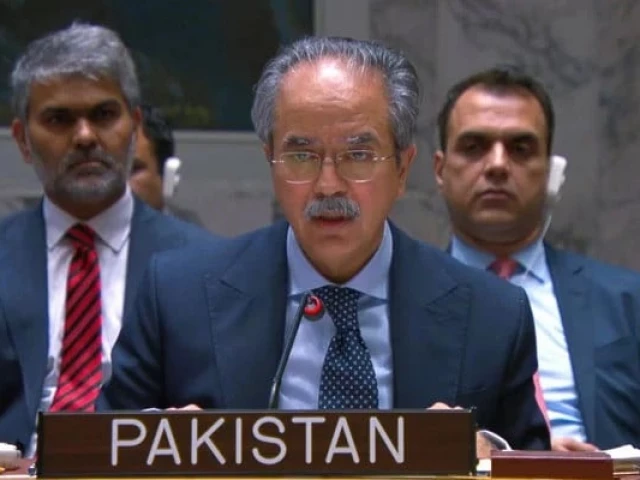Pakistan’s Permanent Representative to the UN, Ambassador Asim Iftikhar Ahmad, speaks during the UN Security Council meeting on the Israel-Iran conflict, June 13, 2025. Courtesy: X@PakistanUN_NY
THE UNITED NATIONS:
A senior Pakistani diplomat told the United Nations General Assembly that candidates for permanent seats on an expanded Security Council – India, Brazil, Germany and Japan, known as the G4 – were blocking reform of the 15-member council to make it more effective because he said they were unwilling to take into account the interests of more U.N. members.
“The inability to reach agreement on reform does not stem from flaws in the reform process itself, but rather from the position of a few member states unwilling to take into account the broader interests and perspectives of the entire UN membership,” Ambassador Asim Iftikhar Ahmad, Pakistan’s permanent representative to the UN, said on Tuesday, without naming the countries.
Instead of “reform for all,” they seek “privileges for some,” he said during a debate on the restructuring of the Security Council.
“This is the biggest obstacle to reforms,” added Ambassador Asim Ahmad.
Large-scale negotiations to reform the Security Council began at the General Assembly in February 2009 on five key areas: membership categories, the veto issue, regional representation, the size of an expanded Security Council, and the council’s working methods and its relationship with the General Assembly.
Progress toward restructuring the Security Council remains stalled as G4 countries continue to push for permanent seats on the Council, while the United for Consensus (UfC) group led by Italy and Pakistan opposes any additional permanent members. arguing that this would create “new centers of privilege”.
As a compromise, the UfC proposed a new category of members – not permanent members – with longer terms and the possibility of being re-elected.
The Security Council is currently made up of five permanent members – Britain, China, the United States, France and Russia – and 10 non-permanent members elected for two-year terms.
“Security Council reform involves vital interests of all UN member states and therefore must be decided with the broadest possible support of UN members, that is, by consensus,” the Pakistani envoy said.
“Only an acceptable formula with an increase in the number of non-permanent members and fair rotation through regular elections can ensure fairer representation of all states in the Council,” Ambassador Asim Ahmad said. “It is also the essence of democracy”
Opposing any addition of new individual permanent members to the Council, he said the concepts of permanence, privilege and special status should have no place in today’s UN. “Council reform should therefore strengthen the voice of all UN member states.”
“Today, nothing is more anachronistic than individual permanent members, a category of members who shamelessly pursue their own national interest, represent no body and are accountable to no one.
“We cannot turn a blind eye to the historical reality that permanent membership and the veto have often been the root causes of the Council’s paralysis and its non-transparent working methods.”
According to him, the long process of reform of the Intergovernmental Negotiations (IGN) is a mechanism driven by the Member States which has gradually broadened the areas of convergence and reduced those of divergence.
“We firmly believe that, in the interests of the entire UN membership, Member States must be given the time and space to reconcile and expand areas of convergence and narrow divergences within the five groups, which are intrinsically linked.”
The Pakistani envoy said efforts to reach consensus have been hampered by demands from some countries to become permanent members of an expanded council.
“Such aspirations contradict the fundamental principle of sovereign equality,” he said.
The “United for Consensus” proposal, he said, represents an objective, balanced, flexible and inclusive approach designed to meet the legitimate interests of all Member States and regions.
“The group maintains that expansion should only take place in the non-permanent elected category, in accordance with the United Nations Charter. Each region could, however, be allocated seats in the longer term, including the possibility of re-election.”




